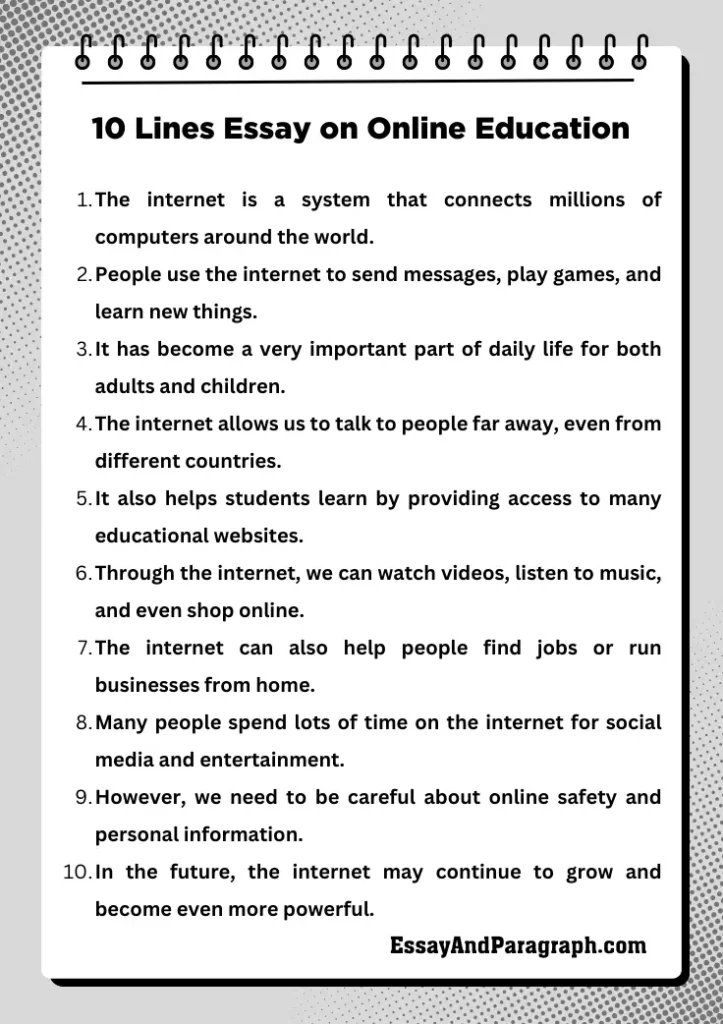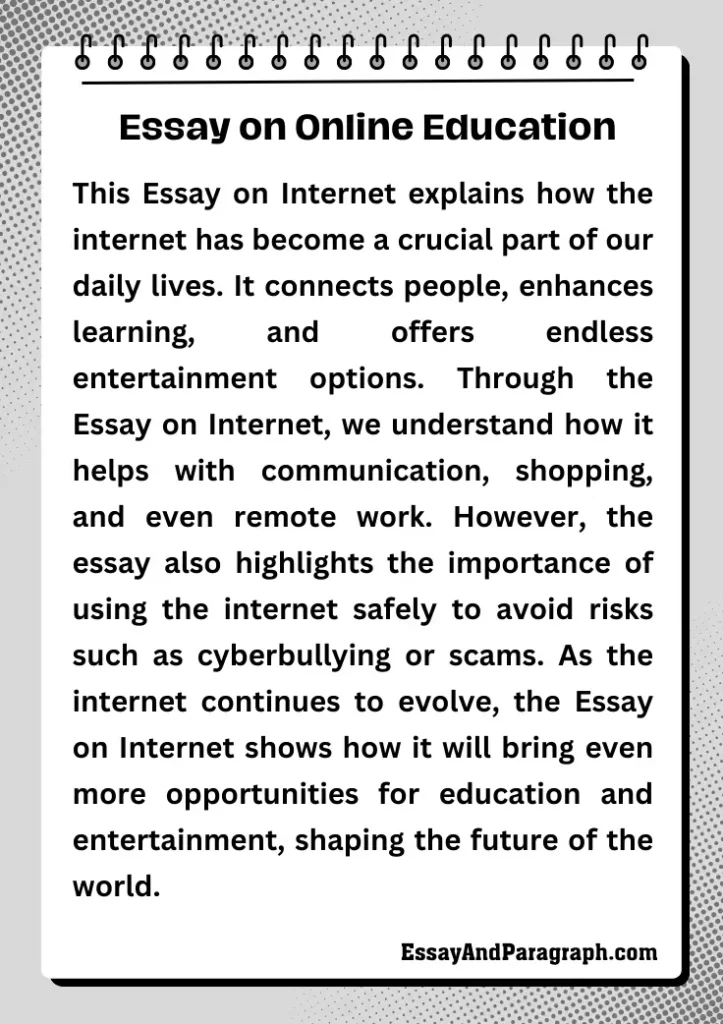Have you ever wondered how learning can happen from the comfort of your home, without stepping into a classroom? Online education, or e-learning, has made this possible for millions of students worldwide. It allows students to take courses, attend classes, and interact with teachers from anywhere. In this article, we will learn how to write an essay on online education and explore the benefits, challenges, and future possibilities of this revolutionary way of learning.
10 Lines Essay on Online Education
Online education is learning that happens on the internet.
It can be done at home, school, or anywhere with an internet connection.
Students can attend classes through video calls or watch recorded lessons.
Teachers can share materials like notes, videos, and assignments online.
This kind of learning is very flexible, meaning you can study at your own pace.
Online education helps students in remote areas access learning easily.
It also provides a variety of courses, from school subjects to special skills.
Students and teachers can communicate via emails or video chats.
However, online education can sometimes be distracting without proper focus.
In the future, online education will continue to grow and improve.

Short Essay on Online Education
Online education has become a popular way for students to learn. Unlike traditional schooling, where students go to a physical school building, online education allows learning from anywhere with an internet connection. Students can join live classes, watch recorded lessons, and complete assignments from home. This flexibility makes it easier for students to manage their time and study at their own pace.
One of the biggest advantages of online education is that it opens up opportunities for students who live in remote areas or have special needs. For example, students in rural areas can now access the same high-quality education as those in big cities. Additionally, online education offers a wide variety of subjects and courses, giving students the chance to explore topics they might not have in traditional schools.
However, there are some challenges too. Without the structure of a classroom, some students may find it hard to stay focused. They might get distracted by social media, video games, or other activities at home. There’s also the issue of technology—students need access to a computer and a stable internet connection. Despite these challenges, online education is improving and evolving, offering a better learning experience every year.
Long Essay on Online Education
In recent years, online education has completely changed the way we think about learning. Unlike traditional classrooms where students gather in one place, online education allows students to take classes, complete assignments, and interact with teachers from anywhere. This new way of learning has made education more accessible, flexible, and, in many cases, more affordable.
One of the most important benefits of online education is flexibility. Students can study from home, at their own pace, and even choose their learning schedules. For example, a student might prefer to study at night after school or on weekends when they have more free time. This flexibility allows them to balance other activities like sports or part-time jobs with their studies.
Another key benefit is accessibility. Students who live in remote or rural areas may not have easy access to schools or educational institutions. Online education bridges that gap by providing them with the same opportunities to learn as those who live in cities. For instance, a student in a small village in India can now access top-notch educational courses offered by universities in the United States or the UK, all thanks to online learning platforms.
Online education also offers a wide range of courses, from elementary subjects to highly specialized fields like technology, arts, or business. This variety helps students pursue subjects they are passionate about and even gain skills that prepare them for future careers. Moreover, online education provides students with the chance to interact with a diverse range of peers and educators from all over the world, expanding their learning horizons and encouraging global collaboration.
However, online education is not without its challenges. One of the biggest obstacles is maintaining focus. Without the physical presence of a teacher and classmates, students might get distracted by social media, television, or even household chores. This is why time management skills and self-discipline are crucial when engaging in online learning.
Another issue is technology. Not all students have access to reliable internet or the latest devices. This digital divide can create inequality in education, especially for students from low-income families. Schools and governments must work together to provide the necessary tools and infrastructure to ensure all students have equal opportunities to learn online.
Despite these challenges, the future of online education looks bright. With advances in technology, such as virtual reality (VR) and artificial intelligence (AI), the online learning experience is becoming more interactive and engaging. In the coming years, we can expect online education to become even more personalized, offering students customized learning paths based on their strengths and weaknesses.
FAQs
1. What is online education?
Online education is a method of learning that takes place over the internet. It allows students to take courses, attend lectures, and complete assignments from anywhere with an internet connection. Unlike traditional classrooms, online education is often more flexible and accessible, offering students the chance to learn at their own pace. Students can use platforms like Zoom, Google Meet, or other virtual tools to connect with teachers and classmates.
2. How does online education work?
Online education typically involves students watching video lessons, reading course materials, and participating in discussions or assignments through an online platform. Teachers upload resources like study guides, quizzes, and homework, and students can complete tasks from home. Many online courses also offer live sessions where students can ask questions and interact with the teacher. Communication often happens through emails, forums, or chat features.
3. What are the advantages of online education?
Online education offers many benefits, including flexibility, convenience, and accessibility. Students can study at their own pace, choose when to study, and learn from anywhere. It’s especially helpful for students in remote areas or those who need to balance their studies with other commitments. Additionally, it offers a wide range of courses, helping students explore subjects outside the regular school curriculum.
4. Are there any disadvantages of online education?
While online education has many advantages, it also comes with some challenges. One major disadvantage is the potential for distractions, as students are learning from home. Without the structure of a physical classroom, students might struggle to stay focused. Additionally, online learning can be difficult for students without access to reliable internet or technology. Lastly, some students miss the social interaction that comes with traditional classrooms.
5. How can students stay focused during online education?
Staying focused during online education requires self-discipline and good time management. Students should create a study schedule, minimize distractions, and set up a quiet study space. It’s also helpful to break study sessions into smaller chunks, so they don’t feel overwhelmed. Staying connected with teachers and classmates through online forums or video calls can also help keep students motivated.
Top 5 Quotes on Online Education
“Online education is the key to unlocking the potential of students, no matter where they are.”
“The beauty of online learning is that it empowers students to take charge of their education.”
“Education is the most powerful weapon you can use to change the world – and online education makes it accessible to all.”
“In the world of education, the internet is the ultimate classroom.”
“Online education isn’t just about learning from a screen; it’s about making learning flexible, accessible, and future-ready.”
Summary
Online education has revolutionized the way students learn, providing flexibility, accessibility, and an endless variety of courses. Whether studying from home or learning new skills, students now have the chance to pursue education on their terms. Though there are some challenges like staying focused and managing technology, the benefits far outweigh the drawbacks. With continuous advancements in technology, the future of online education looks incredibly promising, offering even more opportunities for students around the globe to learn and grow.




